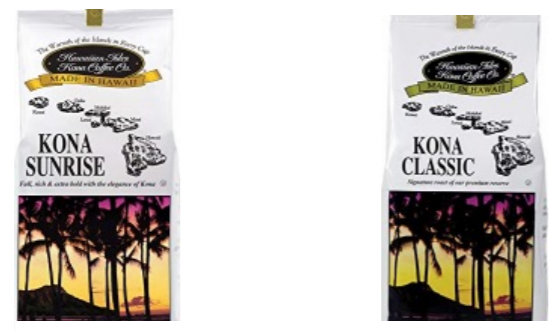Class Action Claims Hawaiian Isles Kona Coffee Contains, At Best, ‘Trace Amounts’ of Authentic Kona Coffee
by Erin Shaak
Chung v. Hawaiian Isles Kona Coffee Company, Ltd.
Filed: April 14, 2020 ◆§ 1:20-cv-00158
A proposed class action lawsuit claims the coffee products sold by Hawaiian Isles Kona Coffee Company, Ltd. do not contain authentic Kona coffee beans.
A proposed class action lawsuit claims the coffee products sold by Hawaiian Isles Kona Coffee Company, Ltd. contain, at most, only “trace amounts” of authentic coffee beans from the Kona District of Hawaii’s Big Island.

The lawsuit explains that genuine Kona coffee—known as one of “rarest and most prized” coffees in the world—comes from beans grown exclusively within the 3,800-acre Kona district of Hawaii’s Big Island. The area’s volcanic soil, elevation, rainfall, proximity to the ocean, temperatures, and sunshine combine to give the coffee grown there its distinctive “flavor, aroma, and mouth feel,” according to the case.
Echoing the fraud claims in a previous case filed by Kona coffee farmers, the lawsuit notes that although the farmers in Hawaii’s Kona district can only grow approximately 2.7 million pounds of green Kona coffee each year, representing only 0.01 percent of the world’s green coffee production, over 20 million pounds of coffee labeled as “Kona” is sold at retail annually.
According to the case, the defendant’s coffee products, which include “Kona Classic,” “Kona Sunrise,” “Kona Hazelnut,” and “Kona Vanilla Macadamia Nut,” are misleadingly advertised and labeled in that the “vast majority” of the coffee was not grown in the Kona district.
The suit says that scientific testing can help determine whether a coffee product contains genuine Kona coffee by measuring the presence or absence of certain elements. Coffee beans grown in the Kona region contain a distinctive ratio of elements due to the unique soil composition, humidity, and rainfall in the area, the case says. By measuring the concentrations of elements found in or absent from both genuine Kona coffee and the defendant’s coffee, scientists can determine “with high confidence” whether a particular package contains authentic Kona beans, the lawsuit asserts.
According to the complaint, testing performed on Hawaiian Isles Kona Coffee Company products revealed that some of the packages contained only “trace amounts” of genuine Kona coffee, while others contained none at all. The suit alleges that most of the coffee beans used to produce the defendant’s products are “commodity beans” or beans grown in “less-desirable regions.”
“In other words, Hawaiian Isles’ designation of Kona as the origin of the coffee in these products was false,” the complaint asserts.
The lawsuit argues that consumers purchased the defendant’s Kona-labeled coffee based on the false representation that the beans were sourced from the Kona district. Had the plaintiff and other buyers known the truth, they would not have bought the defendant’s products, or would have paid “significantly less” than the premium price charged by the company, the case says.
Video Game Addiction Lawsuits
If your child suffers from video game addiction — including Fortnite addiction or Roblox addiction — you may be able to take legal action. Gamers 18 to 22 may also qualify.
Learn more:Video Game Addiction Lawsuit
Depo-Provera Lawsuits
Anyone who received Depo-Provera or Depo-Provera SubQ injections and has been diagnosed with meningioma, a type of brain tumor, may be able to take legal action.
Read more: Depo-Provera Lawsuit
How Do I Join a Class Action Lawsuit?
Did you know there's usually nothing you need to do to join, sign up for, or add your name to new class action lawsuits when they're initially filed?
Read more here: How Do I Join a Class Action Lawsuit?
Stay Current
Sign Up For
Our Newsletter
New cases and investigations, settlement deadlines, and news straight to your inbox.
Before commenting, please review our comment policy.